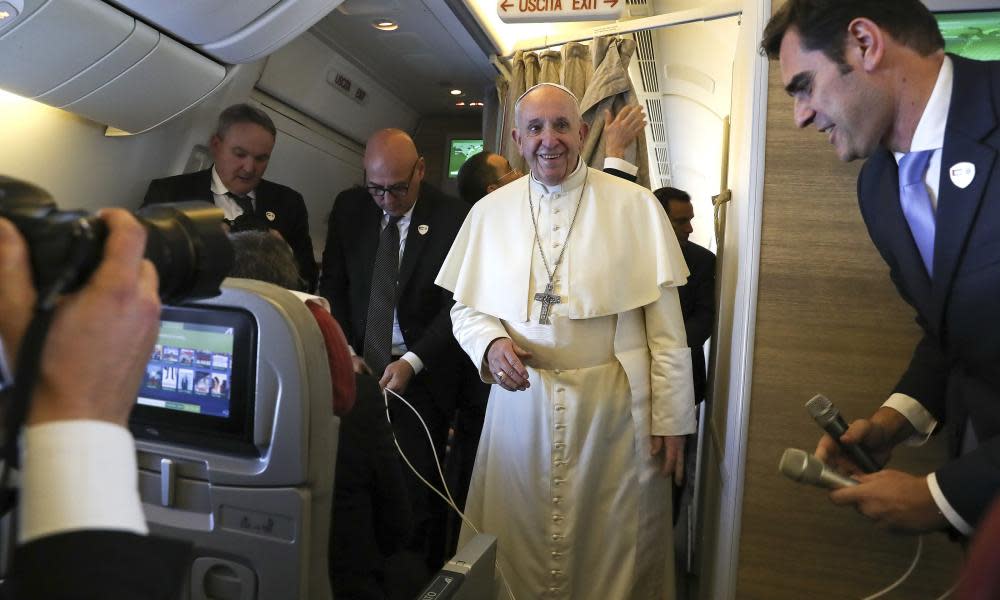Many people in mostly Christian countries believe values clash with Islam – poll

Large numbers of people in Christian-majority countries in the west see a fundamental clash between Islam and the values of their nation, according to a survey.
However, significantly fewer people in the Middle East and North Africa view Christianity in the same way.
Nearly half the people taking part in the poll in France and Germany, and nearly one-third in the US and the UK, thought there was a clash between Islam and the values of society in their country.
When asked the same question about Christianity, 25% of people in Saudi Arabia and 22% of Algerians said there was a clash with the values of their country, but the proportions fell to 13% in the United Arab Emirates and 7% in Egypt.
The poll on attitudes towards religion, carried out by YouGov, was commissioned by the Muslim Council of Elders to mark the first papal visit to the Arabian peninsula. Pope Francis is attending an interfaith conference in Abu Dhabi and will hold an open-air mass on Tuesday expected to be attended by 120,000 people.
Campaigners for religious freedom are highlighting the significance of the historic papal visit to the birthplace of Islam, and hope Francis’s message of peaceful coexistence will be heard in other countries in the region, where many Christians are denied rights or face persecution and death.
The proportion of Christians in the Middle East has fallen to about 4% of the population from about 20% before the first world war, according to the Vatican.
Yousef Al Otaiba, the UAE’s ambassador to the US, said: “The pope’s visit will send a strong signal across the region and world: people with different beliefs can live, work and worship together.
“Not everyone will welcome or embrace the message. Across the Middle East, we face the menace of extremism … Ignoring the threat or being complacent is too dangerous and will only feed the cycle of sectarian violence that has gripped the region for more than a generation.”
Meanwhile, human rights campaigners have urged the pope to use his landmark visit to address the war in Yemen. The UAE is part of the Saudi-led military coalition that has been accused of human rights violations in the country.
In a letter to the pope, Human Rights Watch said the coalition had, since March 2015, indiscriminately bombed homes, markets and schools, impeded the delivery of humanitarian aid and used widely banned cluster munitions.
In a pointed address in St Peter’s Square shortly before boarding his plane to Abu Dhabi, Francis said he was following the situation in Yemen “with great concern”.
He said Yemen’s population was “exhausted by the lengthy conflict, and a great many children are suffering from hunger, without being able to access food supplies”. He added: “The cry of these children and their parents rises up to God.”
Human Rights Watch also urged the pope to put pressure on UAE leaders over domestic political repression, saying freedom of expression and association was under attack, and thousands of low-paid migrant workers in the country were vulnerable to forced labour.
Sarah Leah Whitson of Human Rights Watch said despite declaring 2019 “a year of tolerance”, the UAE government had “demonstrated no real interest in improving its human rights record”.
She added: “But the UAE has shown how sensitive it is to its image on the global stage, and Pope Francis should use his visit to press UAE leaders to meet their human rights obligations at home and abroad.”
The YouGov poll on religious attitudes found in four western countries, respondents had less favourable views of Islam than other religions. In France, 49% said they felt fairly, or very, unfavourable towards Islam, compared with 19% who were unfavourable towards Judaism, 15% to Christianity, 13% towards Hinduism, 14% to Sikhism and 9% to Buddhism.
In Germany, 53% of respondents were unfavourable towards Islam, compared with 10% to 22% who were unfavourable to other religions. In the US and Britain, smaller proportions (37% and 32%) were unfavourable towards Islam, with a similar range viewing other religions negatively.
In north African countries and the Middle East, unfavourable views of Christianity ranged from 43% of respondents in Algeria and 42% in Saudi Arabia to 28% in Egypt and 13% in the UAE.
In Saudi Arabia, Algeria and Egypt, large majorities viewed Hinduism, Sikhism and Buddhism unfavourably. More than half of respondents in Saudi Arabia and Algeria, and 40% in Egypt, had negative views about Judaism.
But in the UAE, numbers were markedly lower. About one-third had unfavourable views towards Hinduism, Sikhism and Buddhism, and 22% had negative views about Judaism. A key factor could be the makeup of the UAE’s population – 90% of whom come from more than 200 countries, with significant numbers from South Asia.
• Harriet Sherwood travelled to the UAE as a guest of the Muslim Council of Elders

 Yahoo News
Yahoo News 
